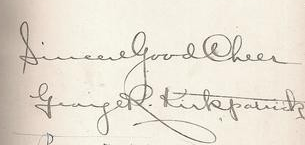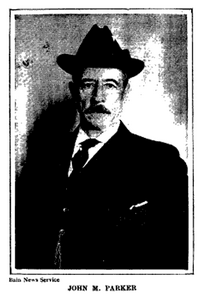Showing posts with label election of 1916. Show all posts
Showing posts with label election of 1916. Show all posts
Friday, June 21, 2019
Ira Landrith
Ira Landrith, March 23, 1865 (Milford, Tex.) – October 11, 1941 (Pasadena, Calif.)
VP candidate for Prohibition Party (1916)
Running mate with nominee: Frank Hanly (1863–1920)
Popular vote: 221,302 (1.19%)
Electoral vote: 0/531
The campaign:
The 1916 Prohibition Party nominees were both what could be called militants on the issue of alcohol. Hanly had organized a prohibition road show called Hanly's Flying Squadron Foundation that criss-crossed the nation in 1914-1915 and Rev. Landrith (a Theodore Roosevelt lookalike) was one of the several featured speakers in that endeavor. A former controversial Republican Governor of Indiana, Hanly had been nominated by (and withdrew from) the Progressives for another gubernatorial run before he accepted the Prohibition nomination for President.
The Prohibition Party platform was a wordy and long document with fairly left-wing economic policies and a strong anti-war stance. It also included this accurate reminder as the Party prepared for a whole new voter bloc: "We condemn the Republican and Democratic parties for their failure to submit an equal suffrage amendment to the National Constitution. We remind the four million women voters that our Party was the first to declare for their political rights, which it did in 1872. We invite their co-operation in electing the Prohibition Party to power."
They were on the ballot in 43 states with their strongest finish being in Florida with 5.93%. Their next best showing was in California with 2.77% (27.713 votes) and that was just enough to tilt the state to Wilson. It was a very close national election and at first it appeared Republican Charles Evans Hughes was the victor over Democrat Woodrow Wilson. Some historians feel that the Hanly/Landrith ticket were spoilers in the Golden State, thus deciding the final outcome of the national result.
This would be last national election where the Prohibition Party finished with more than 1% of the popular vote. Prohibition would be the law of the land during the next four presidential elections.
1916 also saw the election of the only Prohibition Party governor, Sidney Johnston Catts of Florida which might explain why the Presidential ticket also finished so well that state. As it turned out, Catts ultimately didn't do the Party any favors as he was an unapologetic religious bigot, lynch-loving racist, and hater of German immigrants.
Election history: none
Other occupations: Presbyterian minister, President of Belmont College for Young Women in Nashville (1904-1911), editor, orator
Buried: Mountain View Cemetery and Mausoleum (Altadena, Calif.)
Notes:
In the same cemetery as Herbert W. Armstrong, Eldridge Cleaver, Richard Feynman, Laura Oakley,
and George Reeves.
"A Saloonless Nation by 1920, the three hundredth anniversary of the landing of the Pilgrims."--Ira
Landrith, 1915
If elected, and if Frank Hanly had died in the same manner (automobile accident), Landrith would
have become President on August 1, 1920.
Locations: Lebanon, Tenn. 1890 - Nashville, Tenn. 1891-1904 - Chicago, Ill. 1904 - Nashville, Tenn.
1905-1915 - Boston, Mass. 1916-1917 - Chicago, Ill. 1917-1919 - Winona Lake, Ind. 1920-1926 -
Chicago, Ill. 1927-1932 - Winona Lake, Ind. 1933-1937 - Pasadena, Calif. 1938-1941.
Was an officer in the short-lived National Party 1917-1919, which was an umbrella group for
Prohibitionists, former Progressive Party members, single-taxers, pro-war Socialists, and the
National Woman's Party.
George Ross Kirkpatrick
George Ross Kirkpatrick, February 24, 1867 (West Lafayette, Ohio) – March 23, 1937 (San Gabriel, Calif.)
VP candidate for Socialist Party of America (1916)
Running mate with nominee: Allan L. Benson (1871–1940)
Popular vote: 590,524 (3.19%)
Electoral vote: 0/531
The campaign:
No convention was held in 1916. With Eugene Debs deciding not to run for President, Benson and Kirkpatrick were nominated by referendum via the mail by SPA members. Although the Party was a house divided on many issues, one stand that united the Socialists was the belief that the war overseas was not an American war but a war of European capitalists. The more damaging SPA divisions would come later, when the US entered the Great War in 1917.
Although the election results were not as stellar as the previous election, they still had a respectable third place showing. Their top states: Oklahoma (15.55%), Nevada (9.20%), Florida (6.63%), Wisconsin (6.18%), Idaho (5.99%), Washington (5.98%), Arizona (5.47%), Montana (5.38%), Minnesota (5.19%), and Texas (5.09%). They continued to hold steady with winning offices at the local level. This election would be the end of an era for American socialism.
Election history:
1928 - US Senate (Ill.) (Socialist Party of America) - defeated
1932 - US Senate (Calif) (Socialist Party of America) - defeated
1934 - US Senate (Calif) (Socialist Party of America) - defeated
Other occupations: author, teacher, editor
Buried: ?
Notes:
Known as "Kirk"
His opponent in the 1934 Senate race was 1912 Progressive Party VP Hiram Johnson.
Joined the Socialist Party of America in 1903
Best known for his 1910 anti-militarism book, War — What For?
Allied himself with the "Old Guard Faction" in the Socialist split of 1934 and then left the Party.
"Nature gave men two ends - one to sit on and one to think with. Ever since then man's success or
failure has been dependent on the one he used most."--George Ross Kirkpatrick
Divorced and remarried in 1926.
Gave lectures on the prohibition of alcohol in the 1890s.
Caleb Leroy Harrison
Caleb Leroy Harrison, September 20, 1879 (Monocacy Station, Penn.) - June 8, 1938 (Chicago, Ill.)
VP candidate for Socialist Labor Party (1916)
Running mate with nominee: Arthur E. Reimer (1882–1969)
Popular vote: 15,295 (0.08%)
Electoral vote: 0/531
The campaign:
This was the first national election in which the Socialist Labor Party had to struggle without the sectarian leadership of Daniel De Leon, who died in 1914. His handpicked replacement, Danish-born Arnold Petersen, proved a durable choice as he led the Party until 1969.
The 1916 platform was another mini-essay, concluding with: "And we also call upon all other intelligent citizens to place themselves squarely upon the ground of Working Class interests, and join us in this mighty and noble work of human emancipation, so that we may put summary end to the existing barbarous class conflict by placing the land and all the means of production, transportation, and distribution into the hands of the people as a collective body, and substituting the Co-operative Commonwealth for the present state of planless production, industrial war and social disorder--a commonwealth in which every worker shall have the free exercise and full benefit of his faculties, multiplied by all the factors of modern civilization."
For such a tiny political party the campaign certainly attracted a considerable amount of fear and paranoia that would only increase in the coming years. Reimer was jailed in Butte, Mont. and Harrison in Homestead, Penn. for making speeches that were considered too radical.
On the ballot in 18 states, their best finish was in Maryland with 0.29%.
Election history:
1908 - Pennsylvania General Assembly (Socialist Labor Party) - defeated
1910 - US House of Representatives (Penn.) (Socialist Labor Party) - defeated
1911 - Berks County, Penn. County Controller (Socialist Labor Party) - defeated
1912 - US House of Representatives (Penn.) (Industrialist Party) - defeated
1914 - Governor of Pennsylvania (Industrialist Party) - defeated
1916 - Presidential nomination of the Socialist Labor Party - defeated
Other occupations: machinist, roller in a pipe mill
Buried: Acacia Park Cemetery and Mausoleum (Chicago, Ill.)
Notes:
Moved to Chicago from Wilkinsburg, Penn. 1915-1916. Was a resident of Wyomissing, Penn. until
ca. 1913.
By 1920 had converted to communism, assuming a leadership role. Using the pseudonym Atwood, he
helped unify the Canadian communist groups in 1921.
On Aug. 22, 1922 he was arrested with 16 others in the historic raid at a Bridgman, Mich. communist
meeting.
Buried in the same cemetery as Mike Royko.
Vanished from the political radar after 1923 so far as I can ascertain.
[Update: Mar. 12, 2021. Cassidy Stephenson writes: "I am the great-great granddaughter of Caleb Harrison, the vice presidential candidate for the socialist labor party in 1916. I actually went to Acacia Park cemetery to see his grave two days ago and they said he was cremated and we have no idea who has the ashes or if anyone ever even picked him up." -- If any of you readers out there can answer Cassidy's question please drop us a line]
Thursday, June 20, 2019
John Milliken Parker, Sr.
Parker with Theodore Roosevelt, 1915
John Milliken Parker, Sr., March 16, 1863 (Bethel Church, Miss.) – May 20, 1939 (Pass Christian, Miss.)
VP candidate for Progressive Party (aka Bull Moose Party aka Middle-Road Progressive Party) (1916)
Running mate with nominee: Theodore Roosevelt (1858-1919) - Roosevelt withdrew upon nomination
Popular vote: 33,406 (0.18%)
Electoral vote: 0/531
The campaign:
The Progressive Party nominated Theodore Roosevelt for a second time, with wealthy Louisiana businessman John M. Parker as his running mate. But Roosevelt's dislike of Woodrow Wilson was so strong he did not want to be held responsible for the incumbent Democrat's re-election so he rejoined the Republican Party and endorsed Charles Evans Hughes. With that the Progressive Party essentially came to an end as many members followed Roosevelt's lead. Almost.
Some remaining delegates, called "Middle-Road" Progressives could not abide Hughes and even though they had a vice-presidential candidate only in Parker since Roosevelt's presidential nomination vacancy was never refilled, decided to remain in the game if for no other reason than to possibly be Electoral College spoilers. The nobody/Parker ticket was a very unusual arrangement.
During the campaign Parker himself endorsed Wilson.
Nobody/Parker was on the ballot in 12 states. In Georgia they placed second with 12.88% and in Louisiana they finished a very close third with 6.83%. In all other results they were under 1%.
Election history:
1916 - Governor of Louisiana (Progressive Party) - defeated
1920-1924 - Governor of Louisiana (Democratic)
Other occupations: President of the New Orleans Cotton Exchange (1897-1898), commission merchant, cotton broker, wholesale grocer
Buried: Metairie Cemetery (New Orleans, La.)
Notes:
Unapologetic participant in the 1891 lynching of 11 Italians in New Orleans.
Was a vocal political enemy of Huey Long after 1920.
Presbyterian.
First cousin, once removed, to Mary Ann Todd Lincoln
Buried in the same cemetery as P.G.T. Beauregard, Jefferson Davis, Pete Fountain, Jim Garrison, Al
Hirt, John Bell Hood, Louis Prima, and Cora Witherspoon.
Family moved to New Orleans ca. 1871.
Campaigned for Al Smith in 1928.
Mason.
Some sources give his birthplace as Washington, La.
Was with Theodore Roosevelt on the 1902 hunting trip that led to the origin of the "Teddy Bear"
In spite of the "Progressive" label, was a segregationist who worked to keep African-American
participation in the Progressive Party at a minimum.
As Governor, asked the FBI for help in fighting the KKK.
Mourner at the funeral of Huey Long's assassin, Dr. Carl Austin Weiss.
Subscribe to:
Comments (Atom)





















